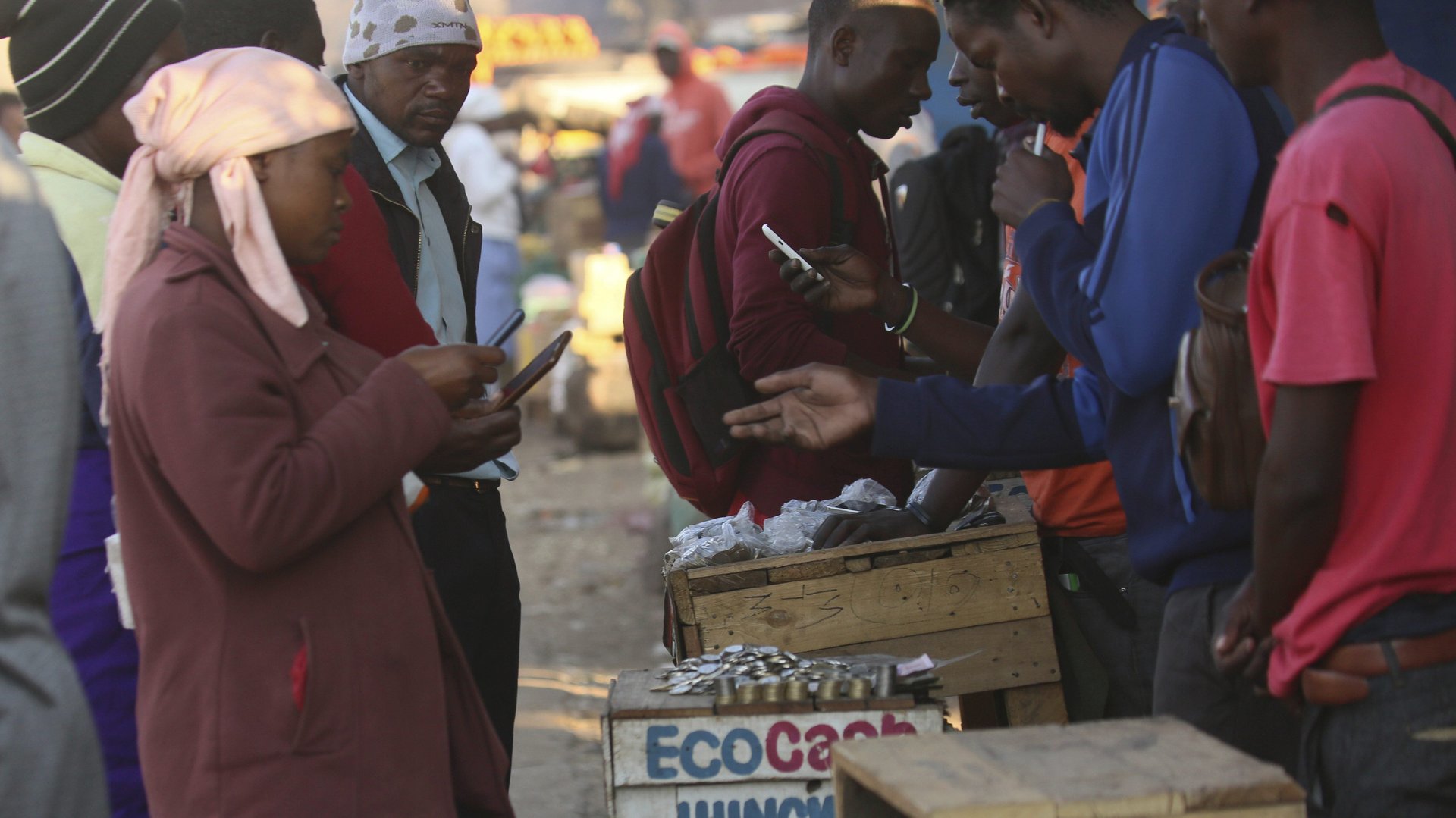Zimbabwe cracks down on currency dealers on social media and mobile money platforms
Zimbabwe is cracking down on social media and mobile money platforms to root out alleged “illegal currency dealers” that the government blames for a plunge in the value of the country’s local unit of exchange. But economists and tech experts warn that this amounts to shooting the wrong target.


Zimbabwe is cracking down on social media and mobile money platforms to root out alleged “illegal currency dealers” that the government blames for a plunge in the value of the country’s local unit of exchange. But economists and tech experts warn that this amounts to shooting the wrong target.
Jee-A Van De Linde, an economist with Oxford Economics Africa, told Quartz “The fact that Zimbabweans are willing to pay premium prices for US dollars tells you that confidence in the local unit remains low.”
Currency dealers are the newest scapegoat for Zimbabwe’s currency issues
Despite notching up some stability in previous months, the Zimbabwe dollar has been in free-fall in recent weeks, ballooning to 1:170 on the parallel foreign exchange market compared to 1:89 on the official forex auction market, against the US dollar. The government now blames “illegal” foreign currency dealers selling local dollars and local electronic balances for the dollars on the streets of Harare and other towns for the plunge in the value of the Zimdollar.
The Reserve Bank of Zimbabwe has now blacklisted about 30 individuals for the “illegal” foreign currency dealings and alleged money laundering transactions after scanning social media platforms such as WhatsApp groups promoting the dealings. Central bank governor, John Mangudya stated on Tuesday (Sept. 21) that the 30 named individuals were “abusing mobile telecommunications services and other social media platforms to promote and facilitate illegal foreign currency transactions.”
Banks, mobile money operators, and other financial service providers have been instructed to “identify and freeze any accounts operated by these individuals and further to bar them from accessing financial services” for a period of two years. Eight local companies have also been taken to court for illegally dealing in foreign currency using the popular EcoCash mobile money platform.
However, Brighton Chiwera, a Harare based independent tech consultant, told Quartz that the targeting of mobile money and banking platforms by the government amounts to “a misdirected” effort which is unlikely to yield a positive result or respite for the local currency.
“These are the wrong targets because there are fundamental issues that need to be addressed. When you look at the so called mobile money accounts being banned, those are a few bad apples and in terms of financial inclusion, there must be substantive regulation that has to be followed.”
Van De Linde told Quartz that although technology has made currency arbitrage opportunities easier, “mobile money certainly is not the main reason fueling parallel market” foreign currency activities. The ban of “illegal” foreign currency traders from mobile money and banking was preceded by Vice President Constantino Chiwenga criticizing “indiscipline on the parallel market” which he said was undermining government efforts to stabilize the local unit of exchange.
The recent crackdown is the latest in interventions by Zimbabwe’s central bank
Zimbabwe’s central bank has already barred banks from processing cryptocurrency transactions despite the popularity of bitcoin and other virtual currencies for use cases such as remittances, trade, and humanitarian disbursements. Mobile money remains important for Zimbabwe’s economy which faces cash shortages at the banks, resulting in daily and weekly cash withdrawal limits, with Zimbabweans forced to exchange their Zimdollars to US Dollars before making key payments.
In a written statement to Quartz, a spokesperson for the World Bank states, “Digital financial services are the strongest foundation for the further development of the digital economy in Zimbabwe, even at a time of macroeconomic woes. The country has a well-developed payment system, where 96% of all transactions in the country are through digital means and only 4% are cash-based.”
The IMF advised the government of President Emerson Mnangagwa in June this year to improve “the business climate and reduce governance vulnerabilities” to foster economic stability.
Despite the elevated foreign currency challenges, Zimbabwe has left bureau de changes functional, sharply contrasting Africa’s biggest economy, Nigeria, which has banned the bureau de changes from selling foreign currency owing to forex shortages.
As Zimbabwe struggles to prop up its local currency, with the official and unofficial exchange rate widening, public mistrust is on the rise. Coupled with a crippling shortage of foreign currency, mobile money is emerging as the go to medium of exchange. With the government cracking down on mobile money, the country’s financial woes may just worsen.
Sign up to the Quartz Africa Weekly Brief here for news and analysis on African business, tech, and innovation in your inbox.